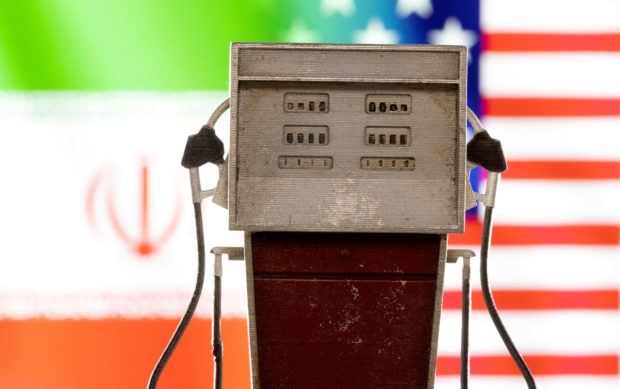
FILE PHOTO: A model petrol pump is seen in front of US and Iran flag colors in this illustration taken on March 25, 2022. REUTERS/Dado Ruvic/Illustration/File Photo
WASHINGTON — The United States on Wednesday imposed sanctions on a network of Chinese, Emirati, and other companies that it accused of helping to deliver and sell Iranian petroleum and petrochemical products to East Asia, pressuring Tehran as it seeks to revive the 2015 Iran nuclear deal.
The U.S. Treasury Department said in a statement the network of people and entities used a web of Gulf-based front companies to facilitate the delivery and sale of hundreds of millions of dollars in products from Iranian firms to China and elsewhere in East Asia.
Washington has increasingly targeted Chinese companies over the export of Iran’s petrochemicals as the prospects of reviving the nuclear pact have dimmed.
In Doha last week, indirect talks between Tehran and Washington ended without a breakthrough over how to salvage the deal, under which Iran had reined in its atomic program.
Then-U.S. President Donald Trump abandoned the pact in 2018 and reimposed sanctions, spurring Iran – which says its program is for peaceful purposes – to begin violating the deal’s atomic limits.
“While the United States is committed to achieving an agreement with Iran that seeks a mutual return to compliance with the (2015 nuclear deal), we will continue to use all our authorities to enforce sanctions on the sale of Iranian petroleum and petrochemicals,” Brian Nelson, the Treasury’s undersecretary for terrorism and financial intelligence, said.
Among those designated by the Treasury Department was Iran-based Jam Petrochemical Company over accusations it exported petrochemical products to companies throughout East Asia, many of which were sold to a U.S.-sanctioned company for shipment to China.
Jam did not immediately respond to a request for comment.
Also targeted was United Arab Emirates-based Edgar Commercial Solutions FZE, which the Treasury said purchased and exported petrochemical products from sanctioned Iranian companies for shipment to China.
Washington said the firm used Hong Kong-based front company Lustro Industry Limited, also designated on Wednesday, to hide its role in bulk purchases of petrochemical products.
Ali Almutawa Petroleum and Petrochemical Trading L.L.C., accused of being a front company for Hong Kong-based Triliance Petrochemical Co. Ltd, was also targeted.
Reuters could not immediately reach Edgar Commercial Solutions FZE, Lustro Industry Limited, and Ali Almutawa Petroleum and Petrochemical Trading L.L.C. for comment.
Chinese refineries over the past two years have been buying large amounts of Iranian oil despite U.S. sanctions on the country’s oil exports. Oil is the lifeblood of Iran’s economy and Chinese imports have helped keep Tehran afloat.
Brian O’Toole, a former Treasury official, said given Iran’s apparent hesitance to return to the nuclear deal, he expects Washington may lean more heavily on China, “because that was the clear point of leakage in the sanctions regime.”
“I think the message to Beijing is as long as Iran is not taking a return to the JCPOA terms seriously, you need to stop importing Iranian oil,” he said, referring to the Iran deal.
Wednesday’s move freezes U.S. assets of those designated and generally bars Americans from dealing with them. Those who deal with the targeted people and entities may also be hit with sanctions.
The U.S. State Department on Wednesday also targeted a Vietnamese company, Truong Phat Loc Shipping Trading JSC, and Singapore-based Everwin Ship Management Pte. Ltd., for engaging in the transport of Iranian petroleum products. Three Iran-based entities were also targeted in the action.
RELATED STORY
Embargoed: countries left out in the cold